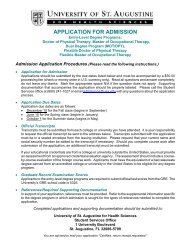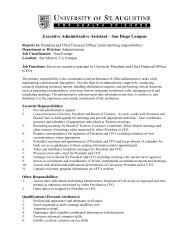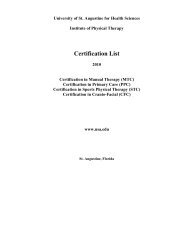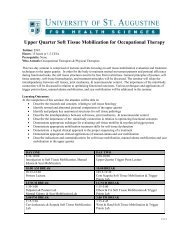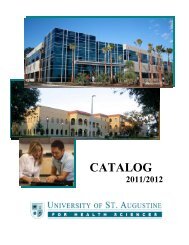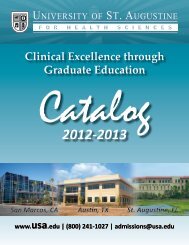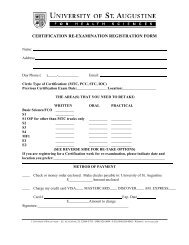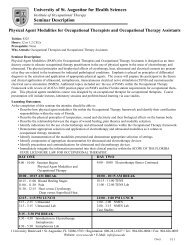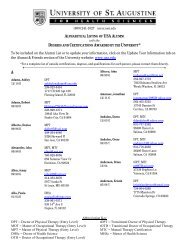University of St. Augustine for Health Sciences 2012 â 2013 Student ...
University of St. Augustine for Health Sciences 2012 â 2013 Student ...
University of St. Augustine for Health Sciences 2012 â 2013 Student ...
You also want an ePaper? Increase the reach of your titles
YUMPU automatically turns print PDFs into web optimized ePapers that Google loves.
Applies to all <strong>University</strong> <strong>of</strong> <strong>St</strong> <strong>Augustine</strong> <strong>for</strong> <strong>Health</strong> <strong>Sciences</strong> <strong>St</strong>udents6. Don’t email a draft <strong>of</strong> your assignment to your pr<strong>of</strong>essor <strong>for</strong> review. If you want guidance oncompleting an assignment, make an appointment to talk on the phone during <strong>of</strong>fice hours.Emailing your assignments to your pr<strong>of</strong>essor asking <strong>for</strong> an in<strong>for</strong>mal review is a way <strong>of</strong> saying“My time is more valuable than yours; tell me exactly what I need to do to get a good grade.7. Don’t expect an immediate response to your email. In some cases, the recipient may not haveaccess to in<strong>for</strong>mation about your question, unless they are in the <strong>of</strong>fice. Twenty-four or even 48hours is a standard window <strong>for</strong> an email response during the business week.8. Don’t wait until a day or two be<strong>for</strong>e a trimester-long project is due to ask <strong>for</strong> feedback or adviceon the project. Doing so reflects poorly on you.9. You are what you email. Your email messages to faculty or staff help shape their pr<strong>of</strong>essionalopinion about you. In some settings, email is the primary means by which they will be able t<strong>of</strong>orm an opinion about you. Remember that you may find yourself asking a pr<strong>of</strong>essor to write aletter <strong>of</strong> recommendation <strong>for</strong> employment, graduate school, or a scholarship. Everycommunication that you have with your pr<strong>of</strong>essors will contribute to the impression that they<strong>for</strong>m <strong>of</strong> you. Make sure that it’s a positive one. Read each email twice be<strong>for</strong>e sending.10. Closely related to the previous tip-consider your audience. The persona you use when you areinstant messaging friends is usually inappropriate <strong>for</strong> communication with faculty and staff,where a higher degree <strong>of</strong> <strong>for</strong>mality is expected.11. Check your syllabus and/or handbook be<strong>for</strong>e asking unnecessary question. Pr<strong>of</strong>essors, who haveto balance an enormously demanding schedule – including course preparations, paper grading,committee meetings, and other types <strong>of</strong> appointments may take umbrage at being asked toprovide in<strong>for</strong>mation that has already been made available.12. Use proper grammar, spelling and punctuation. Whatever pr<strong>of</strong>essional field you enter, adherenceto basic writing skills will serve you well. By ignoring such basics, you risk making a negativeimpression, which will be extremely hard to erase.13. Include a detailed subject line. Never leave the subject line blank, and if you are responding to anold message with an outdated subject line, replace it with the current subject.14. Keep your message concise and precise. If you find yourself writing more than two or three briefparagraphs, consider making an appointment.15. Don’t use all CAPITAL LETTERS or overdo punctuation!!!!! This common practice is theonline equivalent <strong>of</strong> yelling and is considered by many people to be very rude.16. Avoid angry outbursts. Do not send or reply to a message when you are angry. Wait until youhave calmed down, and then compose the email.17. Lay out your message <strong>for</strong> readability. Use spaces and breaks between paragraphs and longsentences to make your messages easier to read.18. Provide your full name at the end <strong>of</strong> every email.This work was adapted from: http://www.elearnmag.ort/subpage.cfm?section=articles&article=62-1It is being used with permission from the authors: Denise D. Knight and Noraly Masselink, <strong>St</strong>ate<strong>University</strong> <strong>of</strong> New York at Cortland.<strong>University</strong> <strong>of</strong> <strong>St</strong>. <strong>Augustine</strong> <strong>for</strong> <strong>Health</strong> <strong>Sciences</strong> 46



